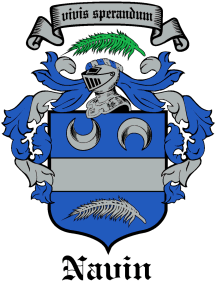 The First Record of the name Navin was found in Ayrshire where they were seated from very ancient
times, long before the Norman Conquest in 1066. Different spellings of the name were found in the
archives researched, typically linking each each alternate to the root source of the surname. The name
Navin, occurred in many references, from time to time,
the surname was spelt Niven, Nevin, Nevins, Nivens, Navin, Newin, Nevane,
Niffen, Nifen, Nephin, Niving, Neving, Neiven, Nivine, Neville and these changes in spelling frequently occurred even between father and son. The family name Navin is believed to be descended originally from the Strathclyde Britons. This ancient founding race of the were a mixture of Gaelic/Celts whose original territories ranged from Lancashire in the
south, northward to the south bank of the River Clyde in Scotland Tracing it ancient development, the name Navin was found in Ayrshire. This particular name is representative of many families in lowlands of Scotland which were firstly of Irish origin and their Irish background becomes obscure from about 600 A.D. to 1200. before this
time the clan was known as Nevin or MacNevin. Descended from Cuamhin, the first Clan Chief, in Leinster, Ireland, who in turn descended from
Cian, third son of Olioll Olum, King of Munster about 130 A.D. At this point in time they migrated to Scotland and became merged into the culture of Strathclyde Briton. The Nevins or Nivens settled in Ayrshire and Galloway, Nevinus, was a parson of Neveth (obviously a
Parish named after the settled family) in 1230 and he witnessed a grant made to the monks of Paisley but it was not
until about 1400 that name Niven began appearing on the family records as a alternate way of spelling the name. Patrick Fitz Nevin rendered
homage in 1296 A.D. To King Edward I of England on his brief conquest of Scotland. Thomas Filius Nyuini
(Niven) was a tenant of Garvalde in 1286. Thomas Nevin was a King's messenger in 1538 and Hew Neving was Burgess of Irvine in 1590. James Nevein inherited Kirkwood in 1635. The Nevins or Nivens of
Monkredding were an old family in Ayrshire, who acquired the lands from the
Abbey of Kilwinning. Notable amongst the family at this time was Nevin of
Ayrshire. By the year 1000 A.D., border life was in turmoil. In 1246, 6 Chiefs from the
Scottish side and 6 from the English side met at Carlisle and produced a set of laws governing all the border clans. These were unlike any laws prevailing in
England or Scotland or, for that matter, anywhere else in the world. In 1603, the unified English and Scottish crowns under
James 1st dispersed these "unruly border clans", clans which had served loyally in the
defense of each side . The unification of the governments was threatened and it was imperative that the "old border code" should be broken up. The border clans were then banished to England, Northern Scotland and to Ireland. Some were Outlawed directly to Ireland or the Colonies and the new world. Many Border Clans settled in Northern
Ireland, transferred between 1650 and 1700 with grants of land provided they "undertook" to remain Protestant. Many became proudly Irish. In
Ireland it became difficult to distinguish those of the name Nevin who had been
planted from Scotland and those who had remained a native of Ireland since their
original Clan beginning in Leinster. It became clear, however, that the spelling Niven was uniquely Scottish. In all, Scottish migrants and native
Irish, in 1650, there were 23 families of Nevin. But life in Ireland was little more rewarding and they sought a more rewarding life. They looked to the New world and sailed aboard the "White Sails" and armada of sailing ships such as the Hector, The Rambler and The Dove which struggled across the stormy Atlantic
some ships lost 30 to 40 % of their passengers list, migrants who were buried at sea having died of Dysentery, cholera, small pox, and
typhoid. In North America, some of the first migrants which could be considered kinsmen of the
Family name Navin and their spelling variants were William Nevin settled in New Jersey in
1685; John, Joseph Michael, Patrick, Thomas and William Nevin settled in 1850 Pennsylvania between 1772 and 1856: James Nevin settled in New York
State in 1823: J.R. Nevin settled in San Francisco, Cal. in 1850: William Niven settled in New Jersey in 1686: Samuel Nivens settled in New York state in 1821. The migrants formed wagon trains
westward, moving to the prairies or to the west coast. During the war of Independence those that remained loyal to the crown moved north into Canada and became known as the United Empire
Loyalist. There were many Notable contemporaries of this name Navin, Robert Wallace
Nevin, F.R.C.S, Consulting Surgeon, St. Thomas Hospital Samuel Nevin, F.R.C.P, Physician,Maida Vale Hospital: His Hon. Judge Thomas Richard Nevin: Sir Ceil Red Nevin;Ian Robertson
Niven, Under Secretary, Department of Environment; James David Graham Niven, Actor-Producer; Margaret Graeme Niven, Portrait and Landscape Painter. The First Record of the name Navin was found in Ayrshire where they were seated from very ancient
times, long before the Norman Conquest in 1066. Different spellings of the name were found in the
archives researched, typically linking each each alternate to the root source of the surname. The name
Navin, occurred in many references, from time to time,
the surname was spelt Niven, Nevin, Nevins, Nivens, Navin, Newin, Nevane,
Niffen, Nifen, Nephin, Niving, Neving, Neiven, Nivine, Neville and these changes in spelling frequently occurred even between father and son. The family name Navin is believed to be descended originally from the Strathclyde Britons. This ancient founding race of the were a mixture of Gaelic/Celts whose original territories ranged from Lancashire in the
south, northward to the south bank of the River Clyde in Scotland Tracing it ancient development, the name Navin was found in Ayrshire. This particular name is representative of many families in lowlands of Scotland which were firstly of Irish origin and their Irish background becomes obscure from about 600 A.D. to 1200. before this
time the clan was known as Nevin or MacNevin. Descended from Cuamhin, the first Clan Chief, in Leinster, Ireland, who in turn descended from
Cian, third son of Olioll Olum, King of Munster about 130 A.D. At this point in time they migrated to Scotland and became merged into the culture of Strathclyde Briton. The Nevins or Nivens settled in Ayrshire and Galloway, Nevinus, was a parson of Neveth (obviously a
Parish named after the settled family) in 1230 and he witnessed a grant made to the monks of Paisley but it was not
until about 1400 that name Niven began appearing on the family records as a alternate way of spelling the name. Patrick Fitz Nevin rendered
homage in 1296 A.D. To King Edward I of England on his brief conquest of Scotland. Thomas Filius Nyuini
(Niven) was a tenant of Garvalde in 1286. Thomas Nevin was a King's messenger in 1538 and Hew Neving was Burgess of Irvine in 1590. James Nevein inherited Kirkwood in 1635. The Nevins or Nivens of
Monkredding were an old family in Ayrshire, who acquired the lands from the
Abbey of Kilwinning. Notable amongst the family at this time was Nevin of
Ayrshire. By the year 1000 A.D., border life was in turmoil. In 1246, 6 Chiefs from the
Scottish side and 6 from the English side met at Carlisle and produced a set of laws governing all the border clans. These were unlike any laws prevailing in
England or Scotland or, for that matter, anywhere else in the world. In 1603, the unified English and Scottish crowns under
James 1st dispersed these "unruly border clans", clans which had served loyally in the
defense of each side . The unification of the governments was threatened and it was imperative that the "old border code" should be broken up. The border clans were then banished to England, Northern Scotland and to Ireland. Some were Outlawed directly to Ireland or the Colonies and the new world. Many Border Clans settled in Northern
Ireland, transferred between 1650 and 1700 with grants of land provided they "undertook" to remain Protestant. Many became proudly Irish. In
Ireland it became difficult to distinguish those of the name Nevin who had been
planted from Scotland and those who had remained a native of Ireland since their
original Clan beginning in Leinster. It became clear, however, that the spelling Niven was uniquely Scottish. In all, Scottish migrants and native
Irish, in 1650, there were 23 families of Nevin. But life in Ireland was little more rewarding and they sought a more rewarding life. They looked to the New world and sailed aboard the "White Sails" and armada of sailing ships such as the Hector, The Rambler and The Dove which struggled across the stormy Atlantic
some ships lost 30 to 40 % of their passengers list, migrants who were buried at sea having died of Dysentery, cholera, small pox, and
typhoid. In North America, some of the first migrants which could be considered kinsmen of the
Family name Navin and their spelling variants were William Nevin settled in New Jersey in
1685; John, Joseph Michael, Patrick, Thomas and William Nevin settled in 1850 Pennsylvania between 1772 and 1856: James Nevin settled in New York
State in 1823: J.R. Nevin settled in San Francisco, Cal. in 1850: William Niven settled in New Jersey in 1686: Samuel Nivens settled in New York state in 1821. The migrants formed wagon trains
westward, moving to the prairies or to the west coast. During the war of Independence those that remained loyal to the crown moved north into Canada and became known as the United Empire
Loyalist. There were many Notable contemporaries of this name Navin, Robert Wallace
Nevin, F.R.C.S, Consulting Surgeon, St. Thomas Hospital Samuel Nevin, F.R.C.P, Physician,Maida Vale Hospital: His Hon. Judge Thomas Richard Nevin: Sir Ceil Red Nevin;Ian Robertson
Niven, Under Secretary, Department of Environment; James David Graham Niven, Actor-Producer; Margaret Graeme Niven, Portrait and Landscape Painter.
Our thanks to John
Navin for providing this information.
|

|

